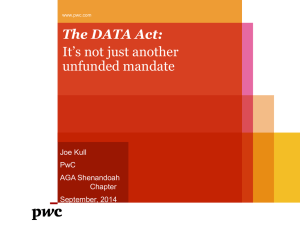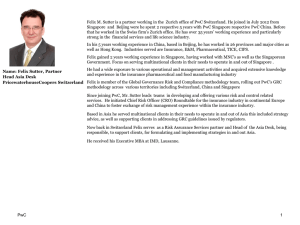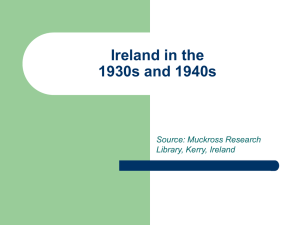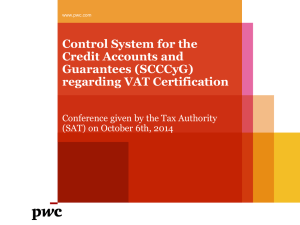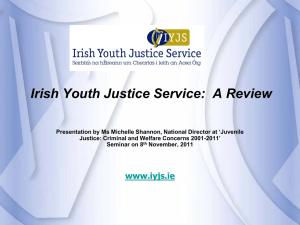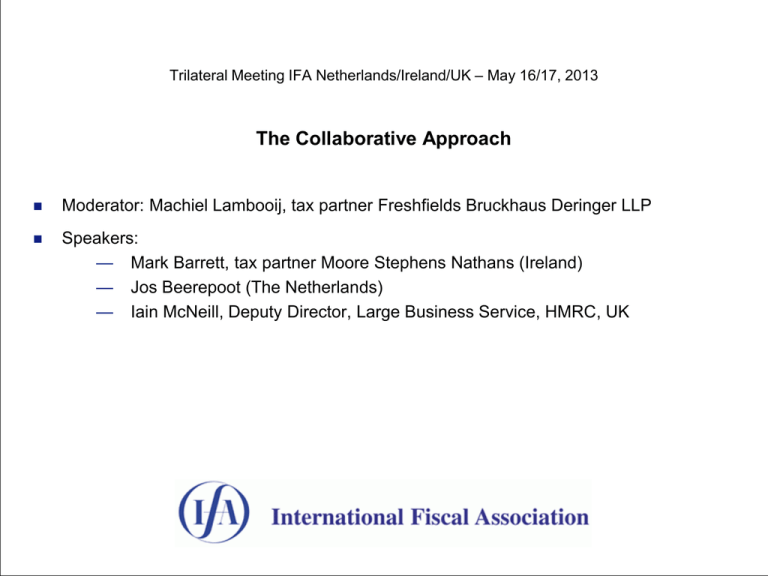
Trilateral Meeting IFA Netherlands/Ireland/UK – May 16/17, 2013
The Collaborative Approach
Moderator: Machiel Lambooij, tax partner Freshfields Bruckhaus Deringer LLP
Speakers:
— Mark Barrett, tax partner Moore Stephens Nathans (Ireland)
— Jos Beerepoot (The Netherlands)
— Iain McNeill, Deputy Director, Large Business Service, HMRC, UK
Mark Barrett
tax partner Moore Stephens Nathans
Ireland
Overview
Framework for engagement between Revenue and intermediaries/stakeholders
Large Businesses – Co-operative Approach (“Cooperative Compliance”)
Interaction between Revenue & Intermediaries
Tax Administration Liaison Committee (TALC)
Customs Consultative Committee
Revenue/Irish Tax Institute Branch Network
Revenue/ITI Annual Joint Conference
Training & Membership
Revenue Technical Service (RTS)
TALC
Established in 1989 (Reviewed in 2009)
“The function of the committee is to review and make recommendations to achieve more
effective and efficient administration of the direct taxes, [income tax, capital gains tax,
corporation tax, capital acquisitions tax] stamp duties and value added tax. These may
relate to either administrative practices of the Office of the Revenue Commissioners or of
tax practitioners.”
Membership, frequency of meetings, rules of engagement, publication of minutes etc
Main TALC and sub-groups (Technical, Audit, Collections etc)
Cooperative Compliance
Large Cases Division - December 2003
Cooperative Compliance – September 2005
212 staff from a total of 5,757
695 Groups and 13,000 companies
Accounts for 60% of tax collection in 2012
30% of LCD corporate base have signed up – not all still active
Cooperative Compliance - Issues
Not legally binding – mutual understanding
Benefits for Revenue & Taxpayer?
Enhanced compliance and increased level of unprompted disclosures
Conflict - case managers are also auditors
Has it worked?
Scheduled for review in Q3 2013
Focus will be on:
Should it be more formalised?
Upside to being in?
Downside to being out?
Resource intensive
Jos Beerepoot
The Netherlands
Bit of history - simultaneous developments early this century:
- Fishing expeditions and polarity
- Tax in the Boardroom
Enhanced relationship / Horizontal monitoring:
Meaning – Seoul declaration leading to Cape Town report
Legal context
What it is
- transparency
- better understanding of business by tax authorities
What it is not
- separate contract creating new legal reality
- worldwide ban on tax planning
How does it work in practice:
Compliance process elements
- self reporting of risks by taxpayer - high level analysis of tax authorities
- limited audits on pre agreed items
- sign off on year within 15 months
Agree to disagree
- juridical disputes on principles - not on facts
Based on mutual trust
Benefits for both business and tax administrations:
- certainty
- efficiency
- better focused compliance processes
Future - ?????
- Co-operative compliance: How far will it reach?
- Pitfalls for companies and tax authorities
- Embedded in legal framework?
Iain McNeill
Deputy Director, Large Business Service, HMRC
UK
HMRC’s Customer-centric strategy
Large Business – a resource intensive, relationship-managed approach
Direct engagement
Getting the right tax agreed early
Treating all customers even-handedly in line with tax law
Consistent outcomes across all customer groups
Prioritise highest risks, upstream effort and real time working
OECD Forum on Tax Administration
Co-operative Compliance: A Framework
From Enhanced Relationship to Co-operative Compliance
Multi-lateral co-operative compliance
Governance
Evidence of success
Developing our strategy
Comments from the floor
&
Closing remarks
IFA – Trilateral NL/IE/UK
Meeting 16/17 May 2013
Europe – Company Tax
Priorities
Thomas Neale, Head of Unit: 'Company Tax Initiatives' DG
TAXUD, European Commission
Three 'new' issues
• Publicity and the profile of taxation
• Need to raise revenue – austerity etc
• Developing business models – eg digital economy
20
Interested parties
• Press, NGOs, Civil Society
• Parliaments
• International – Commission, Council(s), OECD
• G8, G20
21
Recent & Planned developments - Commission
• Action Plan & Recommendations – December 2012
•
•
•
•
Eg: Aggressive Tax Planning & GAAR.
Good Governance Platform,
Company Tax Directives
Input to BEPS
• Arbitration – 2013 Double Taxation Initiative
22
Recent & Planned developments - OECD
• Base Erosion and Profit Shifting (BEPS)
•
•
•
Countering Base Erosion
Jurisdiction to Tax
Transfer Pricing
• Action Plan – June 2013
•
•
•
•
•
•
Sovereignty & Digital Economy
Mismatches, CFCs, Interest deductibility
Harmful Tax Practices
PE definiton
ALP & Formula Apportionment
Dispute Resolution
23
EU TAXATION DEVELOPMENTS – A
MULTINATIONAL VIEW
Jeff Connell,
Tax Manager UK, Africa and Middle East
Shell International Ltd
17 May 2013
CONFIDENTIAL
24
WHAT I WILL COVER
Overall theme: Balancing desire for changing / new regulation with ensuring EU
businesses remain competitive on the global stage
EU tax developments and trends of particular interest to Shell
Focus on country-by-country reporting for extractives
Closing comments and summary
Copyright of Shell International
CONFIDENTIAL
25
CONTEXT AND SCENE SETTING
Shell globally
Operations in over 70 countries
Fully integrated oil major with upstream and downstream operations across various classes of
business
Portfolio becoming increasingly weighted towards gas
Taxes
•In 2012 we paid $21bn in corporate income taxes; over $3.5bn in royalties; and collected over
$85bn of indirect taxes from our customers.
Copyright of Shell International
CONFIDENTIAL
26
CONTEXT AND SCENE SETTING
Shell in the UK
A base here since 1897
In Upstream, a leading player in the North Sea for over 30 years,
Today have an interest in over 50 fields, we produce 12% of UK oil and gas on behalf of
ourselves and partners
In Downstream, our business is growing – we had 1100 branded service stations by the end
of 2012, serving 4 million customers per week
Taxes
•In 2012 we paid $815m in corporate income taxes (CT, SCT & PRT) and collected just under
$17bn of indirect taxes from our customers.
•For 2010 and 2011 we estimate that approximately1% of total UK government receipts in each
year came from Shell
Copyright of Shell International
CONFIDENTIAL
27
Current EU tax developments and trends of
relevance to Shell
Upstream tax take – pressure on government revenues – temptation to see
energy companies as an easy target for short term revenue raising.
Broadening the tax base in the face of tight budgets and public pressure
•Abolition of tax exemptions & incentives
•New taxes – EU Financial Transaction Tax (FTT)
•Cross border aspects – e.g. Interest cost deduction
General tax reforms in the EU – VAT Reform, EU Common Consolidated
Corporate Tax Base (CCCTB) or CCTB…
Increasing audit and compliance, tax issues generally increasingly being
played out in the court of public opinion.
Copyright of Shell International
CONFIDENTIAL
28
Current EU tax developments and trends of interest
to Shell (continued)
Transparency and reputation
• Scrutiny on tax planning – NGO reports in NL; UK press; EU/OECD/UN
focusing on double non-taxation, MNE guidelines.
• Country by country reporting – EU Accounting Directive /Transparency
for extractive industry
Climate Change
• CO2 Pricing – EU ETS (Emissions Trading System), EU ETD (Energy
Tax Directive), energy surcharges (“opslag duurzame energie”)
• Ethanol/excise duties – higher for ethanol, blends.
Copyright of Shell International
CONFIDENTIAL
29
Shell position on extractive transparency
Support increased transparency in the extractive sector
Active members of the Extractive Industry Transparency Initiative (EITI) since its
inception in 2002
Believe host governments should be part of the discussion (as they are in EITI)
Actively pursue enhanced relationships with tax authorities and committed to
being transparent with them regarding business and tax matters
In April 2012 we voluntarily published the payments we made to governments in
2011; and recently reported for 2012.
The solutions developed should be aligned to the underlying objective
Mandatory rules should be aligned globally to ensure a level playing field and to
avoid multiple reporting requirements for the same underlying data.
Copyright of Shell International
CONFIDENTIAL
30
EU extractive transparency developments in context
EITI
Voluntary for countries to sign up, but where they do all extractive companies active in the country
must participate and provide payment data which is then reconciled with data on receipts provided by
the government
Currently implemented in 37 countries (mainly in “developing world”), with 21 of these now meeting
the onerous standards required to be designated “EITI compliant”
US – Dodd Frank Act – payments by extractives
Applicable to extractive companies listed on the New York Stock Exchange
Signed into law in July 2010, Final Rules published Aug 2012
Effective from 1 October 2013 (first reporting for calendar year end companies by May 2014)
Currently subject to litigation by the American Petroleum Institute, outcome should be known before
first reporting is due
Copyright of Shell International
CONFIDENTIAL
31
EU Accounting Directive / extractive transparency
New Accounting Directive and an amendment of the Transparency Directive
Requirement for EU listed and registered companies active in the extractive and
forestry industries, to disclose extractive revenue payments by country, type of
payment and per project
Low materiality thresholds (generally $100k) per type of payment
No exemptions where disclosures are prohibited by the host country
Agreed at EU level, awaiting clarity on how/well this will implemented in
individual countries – currently estimated will take effect from around 2015
Shell will implement the rules when required, although unclear as yet how the
issue of prohibitions will be dealt with
Copyright of Shell International
CONFIDENTIAL
32
Challenges with extractive transparency
Costs vs benefits
Extra-territoriality
Desire for consistent set of rules globally
Level playing field
Copyright of Shell International
CONFIDENTIAL
33
Objectives /claims of the proponents of this
legislation
It will highlight the revenues that governments receive from extraction of
natural resources so that citizens can hold governments to account.
It will reduce corruption.
It will help tackle tax evasion and avoidance.
It will reveal whether companies are paying their “fair share” of taxes.
Copyright of Shell International
CONFIDENTIAL
34
Where next?
Expansion of EITI
To new countries
In scope
Extension of government payment transparency to other sectors?
Fundamental difference between extractives and other industries
Full country by country reporting for all industries?
Copyright of Shell International
CONFIDENTIAL
35
www.pwc.com/eudtg
Selected priorities of the
EU institutions
Sjoerd Douma
London, 17 May 2013
Agenda
•
ECOFIN Council conclusions of 14 May 2013
•
Code of Conduct Group (Business Taxation)
•
State aid: relevance of a pending case on tax planning
•
FTT – compatibility with the Treaties
PwC
May 2013
Slide 38
ECOFIN Council conclusions
14 May 2013
Main conclusions
• Focus on enhanced exchange of information
• Support for OECD BEPS project
• Welcome for Commission’s package on ‘aggressive tax planning’
- however i) Member States remain competent in tax matters, ii)
reccommendations are non-binding instruments and iii) anti-abuse
measures should comply with the EU Treaties
• Call on the Code of Conduct Group (Business Taxation) to rapidly
develop solutions for the ‘problems’ caused by mismatched treatments of
hybrid entities and instruments
• Ex ante coordination of plans for major economic policy reforms,
introduced by the Fiscal Compact, should also focus on tax systems
PwC
May 2013
Slide 39
Code of Conduct Group (Business Taxation)
Report to the Council of 23 November 2012
Highly relevant work package
• Further work on mismatches: hybrid entities and hybrid PE's (PPLs:
proposal for amendment of Parent-Subsidiary Directive will follow)
• Monitoring implementation of agreed guidance on inbound profit
transfers
• Start monitoring asymmetric provisions for capital gains and losses in
Member States' tax provisions
• Preparation of guidance notes for regimes offering beneficial treatment
to interest, royalties, intermediate companies, special economic zones
• Model Instruction to improve spontaneous exchange of tax rulings;
advice sought from JTPF for exchange of unilateral APAs
• Continuing dialogue with Switzerland
PwC
May 2013
Slide 40
State aid
Pending case at Commission level
Spanish tax lease
• Can tax planning result in unlawful State aid?
PwC
May 2013
Slide 41
FTT
Compatibility with the treaties
A number of potential issues
• Article 326(1) TFEU: “[Enhanced] cooperation shall not undermine
the internal market or economic, social and territorial cohesion. It
shall not constitute a barrier to or discrimination in trade between
Member States, nor shall it distort competition between them”
• Article 327 TFEU: “Any enhanced cooperation shall respect the
competences, rights and obligations of those Member States which do
not participate in it”
• Article 326(1) TFEU: “Any enhanced cooperation shall comply with
the Treaties and Union law”
• What has exactly been authorised by the Council?
Appeal with the EU Court of Justice is pending
PwC
May 2013
Slide 42
Thank you!
Sjoerd Douma
Tel: +31 88 792 42 53
Email: sjoerd.douma@nl.pwc.com
© 2013 PwC. All rights reserved. Not for further distribution without the permission of PwC.
"PwC" refers to the network of member firms of PricewaterhouseCoopers International Limited
(PwCIL), or, as the context requires, individual member firms of the PwC network.
Please see www.pwc.com/structure for further details.
Ireland's EU Presidency in an International Tax Policy Context
Gary Tobin
http://www.youtube.com/watch?v=nXTKAEvUkfY
PwC
Neil Sharman
Redomicile
Health Warnings
Personal: my experience only
Corporate: what you should bear in mind
Careful what you promise
Getting in is easier than getting out
46
Redomicile
The London Insurance Market – competition
Why Redomicile
Who are the stakeholders
Design principles
Where to go – what matters
What Changes and what doesn’t
47
Why?
Pros
Cons
Do Nothing
Least disruption
No impact on overhead or PBT
RoE not be maximised versus
competition hence capital
raising more difficult
Delay risks UK legislation
preventing move
Inherent uncertainty to plan
Relocate outside
the UK along with
capital and
proportion of profit
Improves net returns rate over
time
Minimal customer impact
Small increase in overhead
Limited “sell” to stakeholders
Similar structure to that adopted
by peers
Risk of UK regulatory/tax
change affecting intra group
relationships
Change of policy from rating
agencies
Loss of capital efficiency
Mitigation
Struggle with higher cost of
capital and run risk of
takeover by overseas
parented group
Take CFC stance. Or
None
Exposure to basis of tax not
rate of tax
Tax clearances
Flexibility with an exit plan
and/or refinement ready to
go at short notice
48
Stakeholders
The Capital Markets
Shareholders and Exchanges
Lenders and Debt Providers
Rating agencies
The Market
Clients and Customers
Brokers and Agents
Staff
Regulators
Revenue Authorities
49
Principles of design
Platform for growth including ability to attract new funding
UK tax liberalisation increasingly unlikely on both policy and
economic grounds
Holding company and customer-facing units to be in jurisdictions
which cause no material financial or reputational issues
Capital efficiency as/more important than tax efficiency
Holding company in a jurisdiction with territorial basis of taxation
Similar “look and feel” in terms of capital and availability
Capital and profit base can be branches or subsidiaries but
should be in lower tax jurisdictions; branches more capital
efficient by minimising capital fragmentation but can be complex.
50
Holding Company Location
What Mattered
Cost management
Travel – time and cost
Offices - availability and access
Staff
Advisers
Holding Company Location
What Mattered
Shareholder perspective
Currency
Takeover code
Stock exchange indices
Withholding taxes
Holding Company Location
What Mattered
Sustainability
Regime change
Fiscal pressures
Group income and internal pressure
Exit
Holding Company Location
What Mattered
Direct and indirect tax aspects
Expense deduction
Income recognition
Balance sheet taxes
VAT - Intra-group services
Holding Company Location
What Mattered
Tax rate v tax base
Competitive rate
Complexity of regime
Territorial – Real or illusory
CFC’s
Issues
Parent Company location
Ireland
Gib
Holland
Swiss
Lux
CI
Bda
12.5%
0% to
10%(?)
25.5%
~11%
29.63%
0%
0%
Exempt foreign
profits from
subsidiaries
No
Yes (?)
Yes
Yes
Smell test
√√
?√
√√
√√
√
?
√
Employment
√√
√√
√√
√√
√√
XX
XX
Tax certainty
(Rulings)
No
Yes
Yes
Yes
Yes
N/a
Yes to
2015
Tax Simplicity
√
No CFC
√√
No CFC
X
CFC
X
No CFC
X
CFC
√√
No CFC
√√
No CFC
Local tax
Yes
(captives)
Yes
Yes
(Non-EU?)
Note: These are not necessarily correct
56
Issues
Parent Company location (2)
Ireland
Gib
Holland
Swiss
Lux
CI
BDA
To 20%
O%
15%
35%
15%
0%
0%
√√
√√
?
??
√
√√
√√
Share Buy Backs
?
N/A
√√
√√
?
N/A
N/A
Bonus Share
alternative sold to
market
?
√√
XX
?
N/A
Solved by others
√
N/A
√√
√
√√
N/A
N/A
Employment
Costs
Housing
ECJ Case
Tax reform
Access
Housing
Schools
Staffing
WH Tax
Expected
to go ??
Years
Costs
Staffing
Costs
Access
Costs
Staffing
Costs
Access
Staffing
Politics
Housing
Schools
Withholding tax on
dividends paid
Mitigation of Withholding tax
Divi Access Scheme
Other points
Note: These are not necessarily correct
N/A
N/A
57
Why focus on the Netherlands?
What were we looking for?
Political Stability
Accessibility
Certainty of fiscal strategy
Good location for Head Office and in country with tax treaties
Recognised financial centre (not just insurance)
Skilled/accessible labour force and ability to relocate staff easily
EU – regulatory consistency
Acceptability to counterparties (broker committees/policyholders)
Minimal disruption/Minimal loss of renewal business/ Security “look
through”
Bermuda
?
Holland
?
?
?
Holland “ticks all the boxes”: other jurisdictions (like Bermuda) do not
58
Was it different?
Parent company outside UK
Capital and trading risk hence profit outside the UK
Minimal effect on front-end business
Retention of London listing and Code protection
Wholly EU solution
Overall No
but there were subtleties
59
The Fun Problems
Managing the preconceived
How to pay distributions – Roundings
The Scheme of Arrangement and pitfalls
Takeover Code and Company Articles
VAT in a cross border exempt environment
Moving the deckchairs - redomicile is the start not the end
Directors and what it meant for them (travel and fees)
60
Neil Sharman
Parent/Holding Company Location/Relocation
- practical experience Herman Huidink– Baker & McKenzie Amsterdam NV
May 17, 2013
General overview
The Netherlands is THE bridgehead for
many international companies
The infrastructure is one
of the best in Europe
Friendly corporate tax
environment
Stable political
environment
Advanced Financial and
Professional Services
industry
Open and multi-cultural
society
64
Advantages of The Netherlands
– Capital market access across Europe;
– Excellent international business climate;
– Centralised sourcing, treasury, contracting functions;
– Several R&D incentives (innovation box, WBSO, RDA);
– The Netherlands has entered into many bilateral tax treaties;
– Asset protection by virtue of bilateral investment treaty coverage;
– Corporate governance reputation (generally accepted holding
jurisdiction);
65
Tax advantages of The Netherlands
–
No capital tax, net wealth tax or stamp duties;
–
Full access to EU Directives;
–
No Dutch withholding tax on interest- and royalty payments;
–
Private letter ruling policy can provide for advance confirmation on
tax treatment and transfer pricing;
–
Tax consolidation regime available;
–
Functional currency reporting available;
–
It is possible to obtain 30% rulings for expatriates;
–
Extensive double tax treaty network.
66
Dutch tax perspective
Advance tax Rulings (ATR’s) and
Advance pricing agreements (APA’s)
–
Rulings give advance confirmation and prevent surprises but are generally not required.
–
The rulings are not public.
–
Confirmation on transfer pricing (APA) or on the interpretation/application of the law (ATR).
–
A ruling can be obtained typically within 1 – 8 weeks (depending on the subject).
–
Ruling request is often filed in English.
–
Rulings are typically valid for 4 years, but can be 10 years when new operations are set up in
the Netherlands.
–
Rulings can be helpful in discussions with the auditor (uncertain tax positions).
68
Minimum Substance Requirements for
Dutch BV
–
At least 50% of the Board of directors of the companies reside in the Netherlands;
–
The Board Members have a sufficient level of education and experience to fulfill
their tasks;
–
Almost all important board decisions are (physically) made in the Netherlands;
–
The (main) bank account of the companies are held in the Netherlands;
–
The financial accounts are kept (and updated) in the Netherlands;
–
The place of business is in the Netherlands. In addition, the companies – to the
best of their knowledge – are not considered a tax payer in another jurisdiction;
–
The companies have appropriate equity for the functions they perform (taking into
account the assets used and risks assumed by the companies);
69
Certain tax aspects of
company relocation
Certain tax aspects of company relocation
X
X
X
X
X
Company
headoffice
Subsidiaries
• Management
• Company
• Shareholder
Certain tax aspects of company relocation
– Management
Share based compensation, 30% facility
– Company
Substance, APA/ATR, informal capital, amortization of
goodwill, innovationbox, VAT treatment, exit clauses
– Shareholder
Reputational risk, Dividend withholding tax, step up
72
© 2011 Baker & McKenzie. All rights reserved. Baker & McKenzie International is a Swiss Verein with member law firms around the world. In
accordance with the common terminology used in professional service organizations, reference to a “partner” means a person who is a
partner, or equivalent, in such a law firm. Similarly, reference to an “office” means an office of any such law firm.
www.pwc.ie
Parent/Holding
Company Location/
Relocation – Practical
Experience
Denis Harrington
17 May 2013
Agenda
Who has gone to Ireland and why
How they did it and the tax issues they faced
A practical approach to key issues
Recent developments
PwC
May 2013
75
Recent redomiciliation activity to/from Ireland
To Ireland
Cooper Industries (Eaton Corp)
Accenture
Covidien
XL Capital
Warner Chilcott
Ingersoll Rand
Seagate
James Hardie Industries
Experian
Henderson Global Investors
Shire Pharmaceuticals
United Business Media
WPP
Alkermes
Jazz Pharmaceuticals
PwC
From Ireland
Henderson Global Investors
United Business Media
WPP
May 2013
76
Why Ireland is a credible location
Good treaty network
EU Directive access
Broad ranging Dividend Withholding Tax (DWT) Exemptions
No CFC legislation
Participation exemption on disposals
Manageable foreign tax credit system for dividends
PwC
May 2013
77
A typical redomiciliation to Ireland
Shareholders
(1)
Share
Issue
(2)
Shares
cancelled
Irish
plc
Listed
Company
Worldwide
Group
PwC
(3)
New
Shares
issued
• Redomociliations from common
law jurisdictions have been
through a “Scheme of
Arrangement”
• Generally tax neutral for
shareholders
• Cancellation scheme rather than
share exchange:
- Stamp duty advantages
- Practically easier to
implement
May 2013
78
A practical approach to the key issues
Tax issues
Shareholders
Stamp duty on share trading
Dividend withholding tax on
distribution
Local GAAP reporting
Irish
plc
Foreign dividends taxed
(with credit)
PwC
“Say on Pay”
Distributable reserves
planning
Managing Irish tax
residence
Directors’ tax exposures
Non -tax issues
Old Public
Company
(Irish resident)
Intermediate
Holding Co
(EU resident)
Worldwide
Group
May 2013
79
Practical issues – managing Irish tax residence
• Irish residence determined by reference to incorporation unless
exceptions apply
• Key is place of management and control
• Can be achieved through board meetings only
• Majority in Ireland at which directors attend in person
• In practice, authorities look to see more substance particularly where
no other presence in Ireland
• Company secretarial function may suffice
• Important in getting confirmations on tax treatment from authorities
Stamp duty
Dividend Withholding Tax
PwC
May 2013
80
Practical issues - managing stamp duty on share
trading
Shareholders
“Book interests”
issued
Beneficial
Ownership
• Irish legislation provides an exemption for
trading in American Depository Receipts
(“ADRs”).
• Whilst not strictly an ADR programme, Irish
Revenue have accepted that holding shares
through DTC meets the legislative
requirements for the ADR exemption
DTC
Legal title
Irish plc
PwC
• Shares in Irish incorporated companies
subject to stamp duty at 1% on trading.
• DTC typically require Irish Revenue
confirmation that exemption applies
May 2013
81
Practical issues – solving the distributable
reserves conundrum
• Irish plc accounts for acquisition of
“Old” Listed Company at fair value
Shareholders
Irish
plc
Irish plc acquires
shares in “Old”
listed company
through a Scheme
of Arrangement
“Old” Listed
Company
Worldwide
Group
PwC
- typically creates significant capital
on balance sheet, equal to FMV of
group
• Distributable reserves can be created
through a capital reduction process requires
- Approval by shareholders
- Confirmation by Irish Courts
• Typically done soon after the Scheme of
Arrangement is effected
• Still need to get cash to plc to pay
dividends
May 2013
82
Practical issues – IFRS Reporting
• EU incorporated listed companies generally required to report under
local GAAP
• US Securities market expects to see results reported under US GAAP
Expensive and onerous requirement to report under two
accounting regimes
• Ireland allows US listed companies (if they so choose) to report
under US GAAP to satisfy Irish obligations
Exemption lasts until 2020 and may be extended
Does not apply to dual listed companies where other listing
is in the EU
PwC
May 2013
83
Practical issues – dealing with Irish dividend
withholding tax
• Dividends paid by Irish resident companies subject to 20%
withholding tax
• Wide ranging exemptions for treaty resident shareholders who
provide appropriate documentation
• For US listed shares traded through DTC
US residents who have provided a W9 form to broker do not
need to do anything further
• Revenue prepared to give confirmations on exemptions and
grant a one year period of grace to get exemption
documentation in place
• Significant logistical challenges exist for non-US listed MNCs
PwC
May 2013
84
Practical issues – managing directors’ tax
exposures
• Directors remuneration subject to Irish tax regardless of place of
residence
• For non executive directors – full amount subject to Irish tax
But what about travel expenses?
• For executive directors
Need to split compensation between executive duties and role as
board member
Use amounts paid to non executives as a benchmark
Document arrangements
PwC
May 2013
85
Practical issues – exit options
• Key concern of Boards that in an ever changing landscape companies
have the ability to exit a jurisdiction
• We have seen that recent changes in the UK have attracted a number
of redomiciled companies “home”
• Whilst Ireland does have an exit charge, there are exceptions for
companies that are under “good” (treaty/EU) ownership
• Presents companies with a number of options as to how to exit
PwC
May 2013
86
Recent developments in the redomiciliation
beauty parade
• Emergence of reverse acquisition as a means to move parent
company out of the US
• “Say on Pay” as a real Boardroom issue:
UK
Swiss “Minder” proposals
• Emergence of UK as a credible location
But CFC remains a concern
Consideration of “hybrid” structure to get “best of both worlds” on
tax and company law
PwC
May 2013
87
This content is for general information purposes only, and should not be used as a substitute
for consultation with professional advisors.
PwC firms help organisations and individuals create the value they’re looking for. We’re a
network of firms in 158 countries with close to 169,000 people who are committed to delivering
quality in assurance, tax and advisory services. Tell us what matters to you and find out more
by visiting us at www.pwc.com
© 2012 PricewaterhouseCoopers. All rights reserved. PwC refers to the Irish member firm, and
may sometimes refer to the PwC network. Each member firm is a separate legal entity. Please
see www.pwc.com/structure for further details.
Mark Elzenga u/tube : http://www.youtube.com/watch?v=9jWzaRUIpF4).




